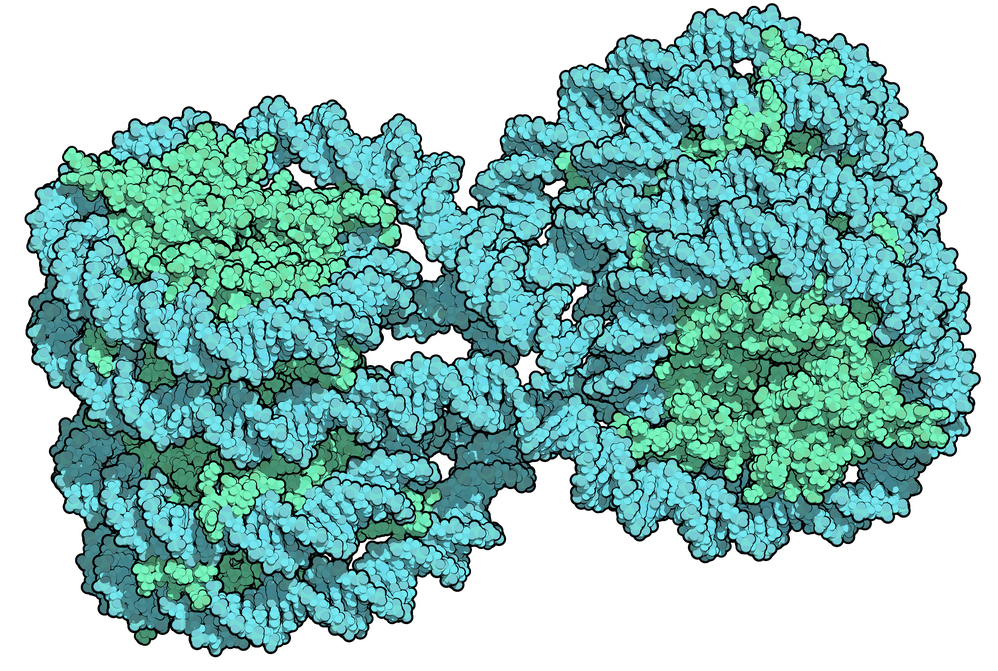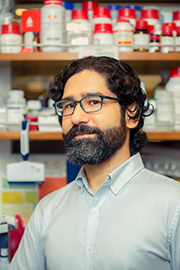
A team led by researchers at Weill Cornell Medicine has identified important drivers of the transformation of a type of blood cancer called follicular lymphoma from a slow-growing form to the aggressive form it takes in some patients.
The study, published March 7 in Cancer Cell, showed that while mutations affecting a gene-regulating complex called BAF can put the cancer on a dangerous trajectory, they also make follicular lymphoma highly susceptible to experimental BAF-inhibitor drugs.

Dr. Ari Melnick
“These encouraging findings could address critical and urgent challenges with this disease and have prompted us to begin planning clinical trials of BAF inhibitors in follicular lymphoma patients,” said study senior author Dr. Ari Melnick, the Gebroe Family Professor of Hematology/Oncology and a member of the Sandra and Edward Meyer Cancer Center at Weill Cornell Medicine.
The study’s co-first authors were postdoctoral researchers Dr. Darko Barisic and Dr. Christopher Chin, and senior research associate Dr. Cem Meydan, all members of the Melnick laboratory. A team led by Dr. Michael Green, an associate professor at the University of Texas MD Anderson Cancer Center, also collaborated in the study, and published a paper with parallel findings.

Dr. Darko Barisic
Follicular lymphoma is the second most common type of lymphoma in the United States, with about 15,000 new cases per year, according to the Lymphoma Research Foundation. Like most lymphomas, it arises from immune cells called B cells. Usually, follicular lymphoma progresses slowly, and remains manageable with various treatments. But a subset of these patients rapidly progress to a transformed, rapidly dividing, and treatment-resistant form of follicular lymphoma within 24 months. The reason for this is unknown, and hence it is very hard to predict if a patient is at risk for this unfavorable outcome. Thus, there is a critical unmet need to identify and develop early intervention therapies for these cases.
In the study, researchers started out by examining the role of mutations in a gene called ARID1A, which encodes a subunit of a versatile, multi-protein molecular machine called BAF. The BAF machinery normally works in cells as a major regulator of gene activity and cell identity by physically changing the shape of the genome. ARID1A mutations and other mutations that disrupt BAF are found in a significant number of patients with follicular lymphoma.

Dr. Cem Meydan
The researchers found that ARID1A deficiency in B cells, and the resulting BAF dysfunction, steers the cells towards an unusual, immature “memory B cell” identity. In this abnormal state, the cells keep re-entering a temporary phase of the B-cell mediated immune response which orchestrates rapid cell division and the diversification of antibodies needed during infections. During this phase, the cells undergo a high rate of mutation, presumably driving them towards ever-greater malignancy.
The investigators wondered whether the tendency of B cells with ARID1A mutations to enter periods of rapid cell division and mutation might explain rapidly progressive follicular lymphoma. Collaborating with colleagues from the British Columbia Cancer Agency, they observed that ARID1A mutations were enriched in the memory B cell-like type of follicular lymphoma, which are at much higher and earlier risk of transformation.

Dr. Christopher Chin
The challenge then, would be to target these dangerous cells to prevent these outcomes. Dr. Melnick and colleagues reasoned that ARID1A-mutant lymphomas might be especially vulnerable to drugs attacking their last remaining BAF functions, which are already compromised by these mutations. Working with BAF inhibitors that are already in clinical trials, they showed in preclinical experiments that ARID1A mutations indeed makes lymphomas profoundly sensitive to these drugs. Mice bearing ARID1A-mutant lymphomas went into complete remission with this drug alone.
“These data raise the possibility of developing early intervention precision therapies for those follicular lymphoma patients at risk for rapid progression, who currently do not have such options,” said Dr. Melnick, who is now working with the clinical team at Weill Cornell Medicine to implement such studies.
“These findings suggest that ARID1A is effectively a tumor suppressor, whose deficiency in follicular lymphoma promotes the transformation to a more aggressive lymphoma,” Dr. Barisic said. Other BAF-subunit mutations frequently found in lymphoma patients might have related roles in driving the disease progression, he added.
“It might even turn out that any mutation affecting the BAF complex, or anything else leading to the formation of these abnormal memory B-like cells, is a marker of transformation risk,” Dr. Meydan said.
BAF inhibitors might also turn out to have a much broader role in oncology, given that BAF-affecting mutations have been reported in about 20 percent of human cancers.
“What is the common mechanism that explains why BAF mutations appear in so many different cancers? There are so many factors at play, untangling the complexity of them would address a significant unmet need in the field of precision oncology,” Dr. Chin said.
This work was supported in part by the National Cancer Institute, part of the National Institutes of Health, through grant numbers: K99CA246080, F31CA254302, R01CA266279, R01MH117406, P01CA214274, R01CA249054 and R35CA220499.
Many Weill Cornell Medicine physicians and scientists maintain relationships and collaborate with external organizations to foster scientific innovation and provide expert guidance. The institution makes these disclosures public to ensure transparency. For this information, see profile for Dr. Melnick.
